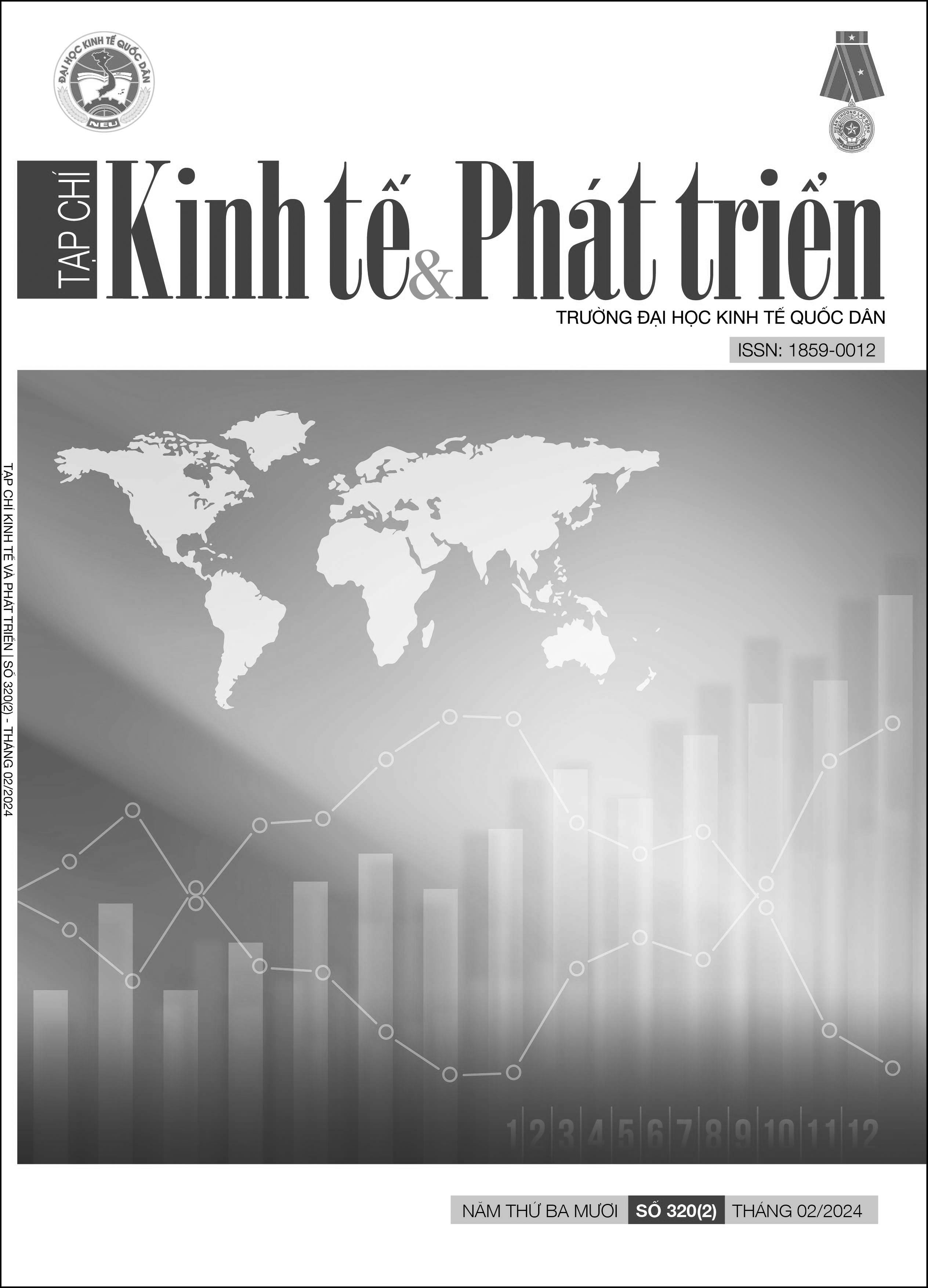Ảnh hưởng của kiến thức tài chính kỹ thuật số đến quyết định sử dụng dịch vụ công nghệ tài chính
DOI:
https://doi.org/10.33301/JED.VI.1456Từ khóa:
Công nghệ tài chính, Kiến thức tài chính kỹ thuật số, quyết định sử dụng công nghệ tài chínhTóm tắt
Nghiên cứu kiểm tra sự ảnh hưởng của kiến thức đến quyết định sử dụng dịch vụ công nghệ tài chính . Dựa vào dữ liệu khảo sát 1000 sinh viên đại học Việt Nam, kết quả cho thấy kiến thức tài chính kỹ thuật số ảnh hưởng trực tiếp và gián tiếp đến quyết định sử dụng dịch vụ công nghệ tài chính. Các nhà làm chính sách, nhà trường và phụ huynh cần phối hợp đồng bộ trong việc nâng cao kiến thức tài chính kỹ thuật số cho thế hệ trẻ.
Tài liệu tham khảo
Ajzen, I. (1991), ‘The theory of planned behavior’, Organizational Behavior and Human Decision Processes, 50(2), 179-211. DOI: https://doi.org/10.1016/0749-5978(91)90020-T.
Al-Mamary, Y. H. S., & Alraja, M. M. (2022), ‘Understanding entrepreneurship intention and behavior in the light of TPB model from the digital entrepreneurship perspective’, International Journal of Information Management Data Insights, 2(2), 1-8.
Appiah-Otoo, I., & Song, N. (2021), ‘The impact of fintech on poverty reduction: Evidence from China’, Sustainability, 13(9), 1-13. DOI: https://doi.org/10.3390/su13095225.
Fishbein, M., & Ajzen, I. (1975), Belief, attitude, intention and behavior: An introduction to theory and research, Addison-Wesley, Reading, MA.
Gieure, C., del Mar Benavides-Espinosa, M., & Roig-Dobón, S. (2020), ‘The entrepreneurial process: The link between intentions and behavior’, Journal of Business Research, 112, 541-548. DOI: https://doi.org/10.1016/j.jbusres.2019.11.088.
Hair, J., Black, W., Babin, B. J., & Anderson, R. E. (2014). Multivariate Data Analysis, 7th Edition. Harlow, UK: Pearson.
Krueger, N. F., & Carsrud, A. L. (1993), ‘Entrepreneurial intentions: Applying the theory of planned behavior’, Entrepreneurship & Regional Development, 5(4), 315-330. DOI: 10.1080/08985629300000020.
Kumar, P., Pillai, R., Kumar, N., & Tabash, M. I. (2023), ‘The interplay of skills, digital financial literacy, capability, and autonomy in financial decision making and well-being’, Borsa Istanbul Review, 23(1), 169-183. DOI: https://doi.org/10.1016/j.bir.2022.09.012.
Morgan, P. J., & Trinh, L. Q. (2019), ‘Determinants and impacts of financial literacy in Cambodia and Viet Nam’, Journal of Risk and Financial Management, 12(1), 1-24. DOI: https://doi.org/10.3390/jrfm12010019.
Nathan, R. J., Setiawan, B., & Quynh, M. N. (2022), ‘Fintech and financial health in Vietnam during the COVID-19 pandemic: In-depth descriptive analysis’, Journal of Risk and Financial Management, 15(3), 1-19. DOI: https://doi.org/10.3390/jrfm15030125.
Lindenberg, S., & Steg, L. (2007), ‘Normative, gain and hedonic goal frames guiding environmental behavior’, Journal of Social Issues, 63(1), 117-137. DOI: https://doi.org/10.1111/j.1540-4560.2007.00499.x.
Liñán, F., & Chen, Y. W. (2009), ‘Development and cross–cultural application of a specific instrument to measure entrepreneurial intentions’, Entrepreneurship Theory and Practice, 33(3), 593-617. DOI: https://doi.org/10.1111/j.1540-6520.2009.00318.x.
Phung, T. M. T. (2023), ‘Vietnam Fintech Industry and Government Support: A Role of Fintech Entrepreneurial Intention’, Public Organization Review, 1-25. DOI: 10.1007/s11115-023-00708-2
Prasad, H., Meghwal, D., & Dayama, V. (2018), ‘Digital financial literacy: A study of households of Udaipur’, Journal of Business and Management, 5, 23-32.
Qin, X., Wu, H., & Li, R. (2022), ‘Digital finance and household carbon emissions in China’, China Economic Review, 76, 1-15. DOI: https://doi.org/10.1016/j.chieco.2022.101872.
Setiawan, M., Effendi, N., Santoso, T., Dewi, V. I., & Sapulette, M. S. (2022), ‘Digital financial literacy, current behavior of saving and spending and its future foresight’, Economics of Innovation and New Technology, 31(4), 320-338. DOI: 10.1080/10438599.2020.1799142.
Song, N., & Appiah-Otoo, I. (2022), ‘The impact of fintech on economic growth: Evidence from China’, Sustainability, 14(10), 1-17. DOI: https://doi.org/10.3390/su14106211.
Venkatesh, V., Speier-Pero, C., & Schuetz, S. (2022), ‘Why do people shop online? A comprehensive framework of consumers’ online shopping intentions and behaviors’, Information Technology & People, 35(5), 1590-1620. DOI: https://doi.org/10.1108/ITP-12-2020-0867.
Wu, J., & Wu, L. (2023), ‘Impacts of digital inclusive finance on household entrepreneurship’, Finance Research Letters, 56, 1-9. DOI: https://doi.org/10.1016/j.frl.2023.104114.
Yang, T., & Zhang, X. (2022), ‘FinTech adoption and financial inclusion: Evidence from household consumption in China’, Journal of Banking & Finance, 145, 1-22. DOI: https://doi.org/10.1016/j.jbankfin.2022.106668.





